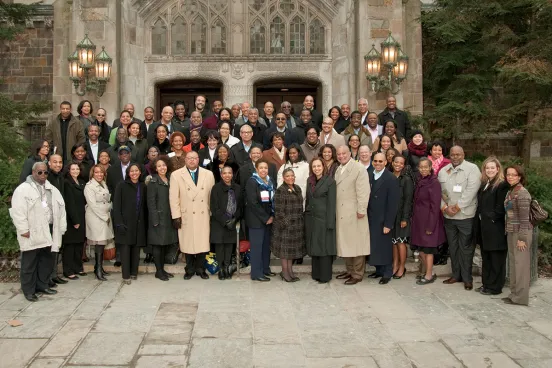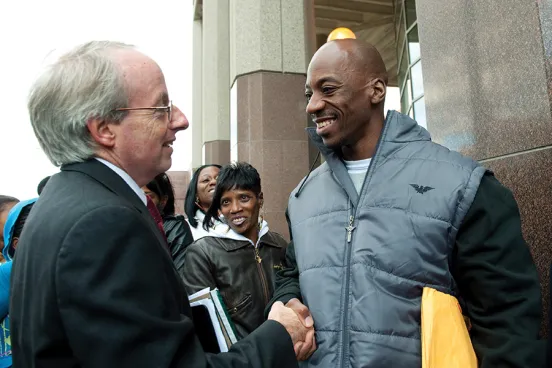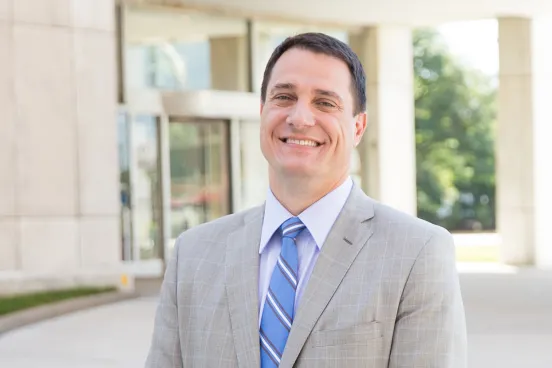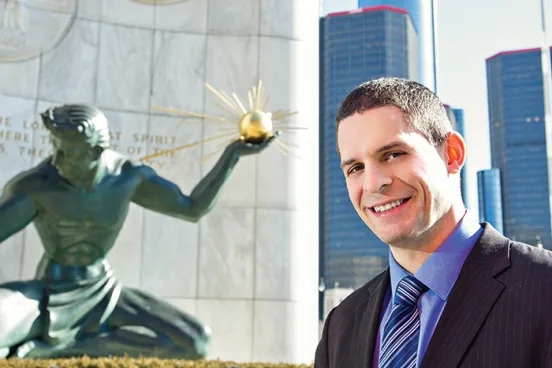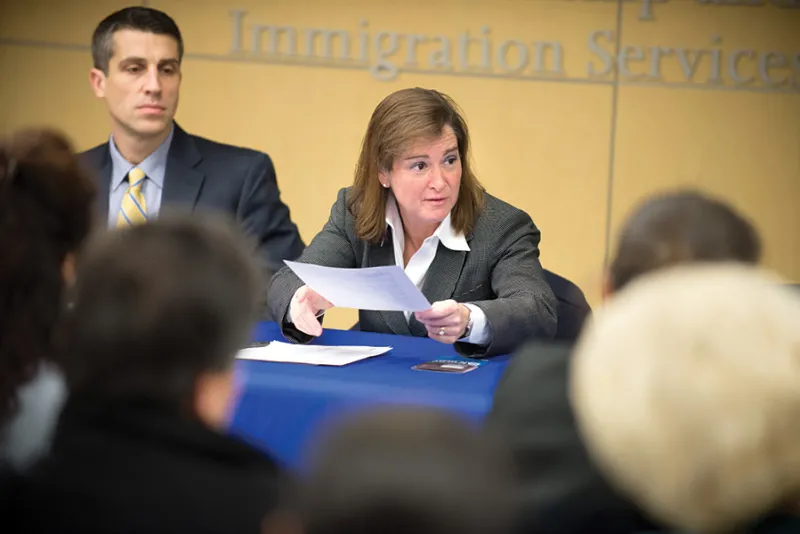
Her tenure as U.S. Attorney began with a would-be underwear-bomber trying to blow up a plane over her district a day after she was confirmed by the Senate. Her office’s successful prosecution of former Detroit Mayor Kwame Kilpatrick made headlines around the world.
So it’s easy to see why the enforcement side of the job is what many people know about Barbara McQuade, ’91, who became U.S. Attorney for the Eastern District of Michigan in 2010.
But there’s much more to her work, says McQuade, who focuses her community-outreach efforts on trying to prevent crimes from happening in the first place.
“I’m really convinced that most of the violence is caused by a fairly small percentage of people in any big city, including Detroit,” she says. “So if we can get the right offenders off the street, we should be able to reduce violent crime.”
While much of her daily work is focused on criminals who aren’t household names, McQuade acknowledges that the successful prosecution of Kilpatrick—who is serving 28 years in federal prison for two dozen felony counts, including mail and wire fraud and racketeering—was a significant step in the city’s efforts to move forward.
“That case is incredibly important,” she says, “because one of the things that Detroit needs to be successful is an accountable government. It was very important to hold him accountable to let people know that they can have trust in their institutions. Public corruption erodes public trust and causes people to become cynical and sends people to the sidelines.”
Meanwhile, health care fraud prosecutions are up, and national security remains a top priority alongside her focus on violent crimes, which may matter most to ordinary citizens in the city.
Under the community outreach aspect of her job, she focuses on investing time in communication, relationships, and information sharing.
Enhancing community involvement is a cornerstone of McQuade’s work on several levels. When she speaks publicly, she describes her office’s three-pronged efforts of enforcement, prevention, and community trust, emphasizing to her audiences that she needs their help.
Getting that message out to immigrants is one of her primary goals.
Last winter, for example, she joined officials from U.S. Immigration and Customs Enforcement and the Federal Trade Commission, as well as immigration lawyers, at a forum to educate immigration advocates about how to track down and report fraud and malpractice. Victims of an attorney who wrongfully promises visas, gives inaccurate advice, or promotes websites that give false hope may be breaking laws, and McQuade urged the audience to report their suspicions when they have them.
“The idea is to help folks not become victims. We don’t want them to be taken advantage of by immigration laws. They are a very vulnerable population, and we want to protect them,” she told the audience. “We have tried to work hard, but I know we have more work to do so we can build those relationships … so people trust us enough to come forward.”
McQuade also uses a community-involvement strategy to help address violent crime throughout eastern Michigan— specifically in Detroit, Pontiac, Flint, and Saginaw, where federal law enforcement works with local officers, partially funded with state money.
In early 2013, McQuade also was part of the creation of Detroit One, which brings together law enforcement and people in the community to make the city safer. With 387 homicides in Detroit in 2012, McQuade and leaders of the Detroit Police Department, as well as other federal, state, and local agencies, developed a strategy to reduce violent crime. With increased information sharing, joint task forces to target the most violent or notorious offenders, and other efforts, some of the “worst of the worst” criminals have been arrested and prosecuted.
But the Detroit One effort isn’t just about arresting and prosecuting, McQuade says. “We’re trying to get down to the underlying causes of crime and prevent them from occurring in the first place,” she says. One of those efforts includes officers and agents meeting with gang members, and detailing the harsh federal penalties that can result from multiple gun and drug charges.
“We talk to them first about how, if they commit another crime, here are the penalties that could result,” she says. “They’re very rational. When you call them in and you call them by name and say, ‘I know who you are, I’ve got a file, and I’m telling you next time you commit a drug offense or a gun offense, you’re going to be facing 20 or 30 years,’ they make rational choices based on that information.” (See detroitone.org for more information.)
Enforcement remains paramount, but she views her efforts at relationship building in communities as an investment in investigative work that ultimately will pay off in safer communities and even more successful prosecutions by her staff.
“We’re trying to do our job to be most effective, and to be most effective requires getting information. That’s the currency we trade in,” she says. “We need information to build cases, and I think whenever you design your program to maximize the amount of information you’re getting, you’re not being soft on crime—you’re actually being effective.”
A native of southeast Michigan, McQuade spent the year between her undergraduate work in economics and communications at Michigan and her entrance into law school as a sports writer and copy editor in Rochester, New York. As a journalist in the Lake Ontario port city, she followed several minor league and Syracuse University teams and reported on “high school swim meets and lacrosse games, the Lilac 10K, the fishing derby on Lake Ontario, the beach volleyball game with the celebrity DJs.” And while she calls her newspaper work “great fun,” she was thrilled when she was accepted to Michigan Law; she never returned to journalism, as originally planned.
“I discovered I really loved the law. I loved every minute of being in law school at Michigan,” McQuade says. “I knew what a privilege it was, how lucky I was to be there. The legal education you get at Michigan prepares you well for all the legal challenges that you might face in life.”
Her favorite memories are of late-night conversations with her classmates, and she still stays in touch with her five roommates from her 2L and 3L years.
Following law school, she clerked for the Hon. Bernard A. Friedman on the U.S. District Court for the Eastern District of Michigan and briefly worked at Butzel Long before joining the U.S. Attorney’s Office in Detroit. Along the way, she started dating and then married Dan Hurley, ’90, who also is an assistant U.S. Attorney. When McQuade was promoted and would have been her husband’s boss, he was reassigned to Ohio’s Northern District. They live in Ann Arbor with their four children.
Shortly after McQuade was sworn in as the top U.S. Department of Justice official in Michigan in 2010, she restructured the office and its 215 employee positions. The organizational chart hadn’t changed much since the 1970s, when there were 35 lawyers on staff. “We grew to 115 attorneys over the years, but rather than reorganizing we had just added and added and added lawyers,” McQuade explains. “It seemed to me that the challenges of 2010 were very different than the challenges of the 1970s, with national security, cyber crimes, health care fraud, civil rights, and other different challenges that we were looking at.”
With smaller units of supervision, there is better accountability, she says. With dedicated legal units for health care, for example, specialists can handle complicated cases.
“Those cases can take a long time to put together. They had sometimes languished behind cases that are a little more immediate and have more immediate deadlines,” McQuade says. “By having the dedicated unit, those cases have become very successful, and we have a really thriving health care fraud practice.”
She is pleased by the work that her office has accomplished, and she is quick to credit her staff for all the office’s accomplishments. It’s her dream job, she says—or, rather, one of her dream jobs.
“If I could be anything I could be in the whole wide world,” McQuade says with a grin but a certain earnestness, “I would be the shortstop for the Tigers.”



